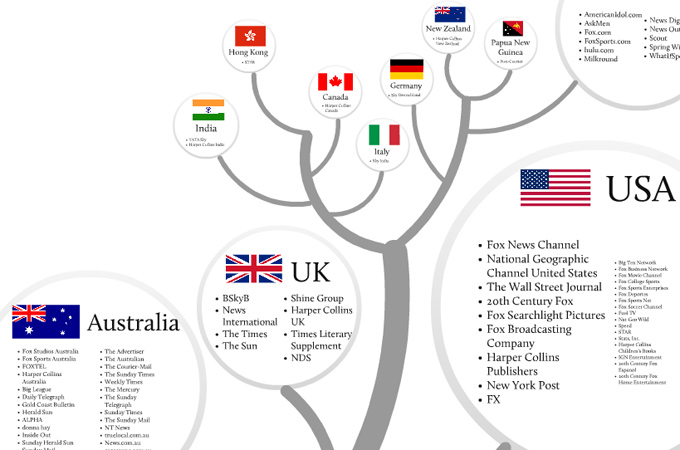Media concentration: ownership is a process whereby progressively fewer individuals or organizations control increasing shares of the mass media.
Conglomerates: multi-industry company – i.e., a combination of multiple business entities operating in entirely different industries under one corporate group, usually involving a parent company and many subsidiaries. Conglomerates are often large and multinational.
Globalisation (in terms of media ownership): is the worldwide integration of media through the cross-cultural exchange of ideas, while technological globalization refers to the cross-cultural development and exchange of technology.
Vertical Integration: Media Company owns different businesses in the same chain of production and distribution. … When a company expands its business into areas that are at different points on the same production path, such as when a manufacturer owns its supplier and/or distributor.
Horizontal Integration: where an organisation develops by buying up competitors in the same section of the market e.g. one music publisher buys out other smaller music publishers. BBC | Dragons’ Den Definition: A situation when two firms in the same industry and at the same stage of production come together.
Gatekeepers: a process by which information is filtered to the public by the media. … This news perspective and its complex criteria are used by editors, news directors, and other personnel who select a limited number of news stories for presentation to the public. (Somebody who is exerting power)
Regulation: Media regulations are rules enforced by the jurisdiction of law. Guidelines for media use differ across the world.
Deregulation: reduction or elimination of government power in a particular industry, usually enacted to create more competition within the industry. Over the years the struggle between proponents of regulation and proponents of no government intervention have shifted market conditions.
Free market: economic system based on supply and demand with little or no government control. … Based on its political and legal rules, a country’s free market economy may range between very large or entirely black market.
Monopolies: market structure characterized by a single seller, selling a unique product in the market. In a monopoly market, the seller faces no competition, as he is the sole seller of goods with no close substitute.
Mergers: a merger or acquisition in which 2 or. more of the undertakings involved. carry on a media business in the. State; or.
David Hesmondhalgh
David Hesmondhalgh is among a range of academics who critically analyse the relationship between media work and the media industry. In his seminal book, The Culture Industries. A critical reflection that highlights the ‘myth-making’ process surrounding the potential digital future for young creatives, setting up a counter-weight against the desire of so many young people who are perhaps too easily seduced to pursue a career in the creative industries.
Rupert murdoch media empire:
Organizations founded: Fox News, Sky Group, Sky News,

Murdoch dynasty regulation when he went to Uk he wanted control over all of sky however in the Uk it is against the law to own all news organisations. Therefore he only owns 39% of sky.
Theorists Chomsky: Manufacturing consent in relation to Murdoch this was when he influenced the Uk public to support the labor part and get tony Blair elected as prime minister.
